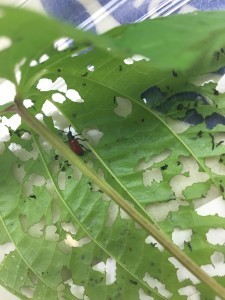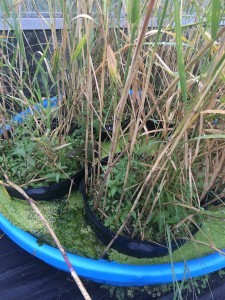Nestled behind the greenhouses and the coastal institute, there’s a silent war going on at the University of Rhode Island’s Biocontrol Center.
Stocked in chilly refrigerators or warming under lamps are the aggressors in the war on invasive plants and insects: bugs. It’s part of something Biocontrol Lab Coordinator Lisa Tewksbury calls “classical biological control.â€
“When a pest comes into the country, whether it’s an insect or plant that’s not native, it becomes a problem,†Tewksbury said. Her team, under the supervision of URI Graduate Professor of Entomology, Dr. Richard Casagrande, look to find the “native range of the pest†and analyze the natural enemies to control it.

Tewksbury’s research includes bringing in different insects and plants to control invasive species. The lab works closely with the Rhode Island Department of Environmental Management (DEM). When the DEM organizations or private groups bring an invasive species to Tewksbury’s attention, the lab then gets funding to go and analyze the invasive species and do research to bring an agent, most likely an insect, into the area to try and control it.
“It’s like bats and how they control mosquitoes,†Tewksbury said. “We’re just getting a little more specific.â€
The facility, which opened in 1994, consists of a quarantine lab with three rooms where different specimens are kept. Before getting to those chambers, visitors and researchers must enter through a second room with two doors to ensure that no bugs escape from the facility.
“We really have to make sure that nothing gets out before we want it to,†Elizabeth Jones, a URI senior biological sciences major who works in the biocontrol lab, said. “We do extensive research to make sure that the insect eats only what it’s supposed to.â€
Their work in the lab includes extensive tests to make sure the insects don’t go after any other native plants. During her time researching, Jones tests the specimens in different environments and how they react with other types of plants and insects. Â
While the lab works on several different projects at a time, the winter season is pretty slow for Tewksbury. Throughout the summer, Tewksbury said the chambers are full of activity and they have more of a staff to work with.
Right now, the biocontrol lab is working with Black Swallowwort, an invasive plant that is closely related to milkweed. Black Swallowwort is a very invasive weed, according to Tewksbury, specifically in Rhode Island and the New England areas.
Tewksbury said the Swallowwort plant chokes out the surrounding grass and any other plant and poses a threat to monarch butterflies, since they can confuse the Swallowwort for milkweed, and accidentally lay their eggs. Those eggs become malnourished through the Swallowwort, and it deeply affects the monarch butterfly population.
The Swallowwort research started in 2005 when a graduate student working with the lab went to Europe and did research as to what insects would control this weed. The student came back to the facility with five different insects, and wrote his dissertation on which insects would be the most appropriate and safest to help control the Swallowwort.Â

In order to be a biocontrol agent, the insect “must be a good natural enemy, and host specific,†Tewksbury said.
In addition to the Swallowwort, the lab has also worked with Mile-a-minute, an invasive vine, which had been in the area for a long time. The biocontrol agent for the vine is a type of weevil that lays its eggs on the seed stalks. When the weevil larvae hatch, they feed down the vine, preventing further growth.
Even though Jones doesn’t necessarily want to go into entymology, she’s always had an interest in plants and insects. She said she’s happy to have this kind of experience on her resume.
“It’s really great experience with lab work and field work,†Jones said. “It’s not something you think of, but it’s everywhere.â€
Students are both able to help and to conduct their own research in the labs. Sometimes they work with taking care of the plants, collecting data or anything else to facilitate the research processes.
“It’s good to learn how to get your hands dirty,†Kevin Lamothe, a URI graduate student, said. “You can’t control nature, there are always surprises.â€
In terms of the future of biocontrol labs like the URI facility, Lamothe and Jones agree that this is the future of invasive species management.
“It’s all about restoring balance and preserving biodiversity,†Lamothe said. “You can’t get rid of all the invasive species, but biocontrol is a natural solution that works. It sort of completes the cycle.â€

